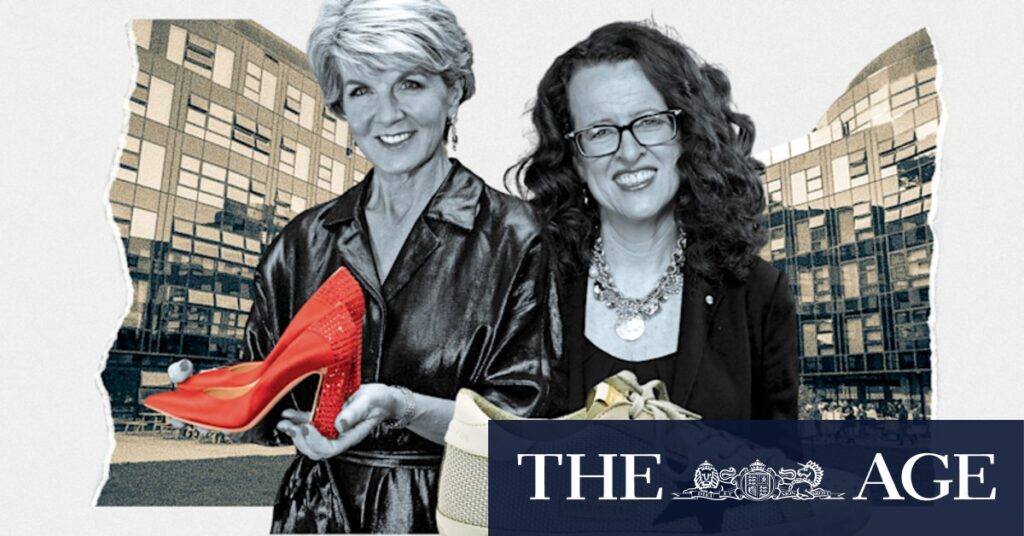
In the late 1990s, Intel sought social scientists to explore technology use in homes, aiming to transform human behavior experts into technology visionaries. During Genevieve Bell’s interview, she candidly identified as a “radical feminist and an unconstructed neo-Marxist,” as reported by The New York Times in 2014. Intel valued her forthrightness, a trait she found less appreciated in academia. “At Stanford, they didn’t like it when you told the faculty they were dead wrong, whereas here, that was a cultural value,” she noted.
In 2017, Bell returned to Australia, recruited by Nobel laureate Brian Schmidt, then ANU vice chancellor, to lead a new institution focused on artificial intelligence and human experience, now the School of Cybernetics. By September 2023, Bell was appointed vice chancellor, equivalent to a CEO, by ANU’s council, chaired by Julie Bishop. Despite her new role, Bell remained on Intel’s payroll until November 2024, earning approximately $70,000 for 24 hours of work, a revelation that surprised many in the academic sector.
Leadership and Financial Struggles at ANU
Bell’s transition to vice chancellor was personally challenging. She embraced her femininity in the male-dominated tech world with French perfume and high heels. However, upon assuming her new role, she faced advice to alter her image, as Amy Capuano, her head of public affairs, shared on LinkedIn. Yet, her professional hurdles were more daunting, taking over a financially strained university.
Prior to the pandemic, Schmidt limited student numbers to avoid mass-market education, unlike universities in Sydney and Melbourne. ANU also faced infrastructure challenges and damage from a 2018 weather event, leaving it financially vulnerable when COVID-19 struck. The Coalition government’s refusal to allow universities JobSeeker payments compounded these issues. The Job-ready Graduates package further reduced funding for teaching local students, impacting smaller courses’ viability.
Bell also encountered cultural issues. A report by former NSW assistant police commissioner Christine Nixon highlighted a “deeply dysfunctional culture” at ANU, marked by bureaucracy and resistance to change. “You could argue that she inherited a situation that had been building for a number of years,” noted higher education policy expert Andrew Norton. However, he questioned the council’s decision-making, appointing two VCs without extensive university administration experience.
Financial Transparency and Accountability
Uncertainty surrounds ANU’s financial crisis. Bell and Bishop describe it as dire, citing a $140 million operational deficit in 2024. They proposed a $250 million budget cut, including $100 million in staff reductions, with over 220 voluntary or forced redundancies. However, transparency issues persist, with Pocock questioning the necessity of such cuts.
“If the ANU’s finances are as bad as Bell and Bishop say they are, why wasn’t this issue addressed earlier on?” – Andrew Norton
Controversy also surrounds the cost of supporting Bishop. In 2023, ANU spent $186,000 on a Davos trip for Bishop, Schmidt, Bell, and other executives, hosting a $78,000 reception. Bishop’s expenses, including her Perth office and travel, totaled $790,000. Accusations of hiring her former media adviser for speechwriting further fueled criticism.
Cultural and Gender Dynamics
The scandal intensified with allegations from Dr. Liz Allen, an ANU demographer, claiming Bishop blocked her from leaving a room over leaked information. Bishop denied these allegations, asserting respect for staff. The situation highlights the “glass cliff” phenomenon, where women are given precarious leadership roles.
Bell described the campaign against her as “tall poppy syndrome,” citing sexism not faced by her male predecessor. ANU professor John Blaxland urged support for Bell, recognizing the challenges she faces. However, anonymous “ANU Gender Experts” argued against using gender as a shield from criticism, emphasizing accountability.
“Women in powerful positions cannot be immune to criticism, nor should their gender protect them from scrutiny.” – ANU Gender Experts
TEQSA is now investigating, with concerns over financial transparency and staff intimidation. ANU acknowledged the challenges, citing $59.9 million in savings achieved. In a Canberra Times interview, Bell expressed confidence in ANU’s direction, emphasizing the importance of meaningful work.
The ongoing scrutiny of ANU’s leadership and financial management underscores the complexities of navigating institutional challenges amid cultural and gender dynamics. As TEQSA’s investigation continues, the university’s future course remains a subject of intense debate and analysis.






